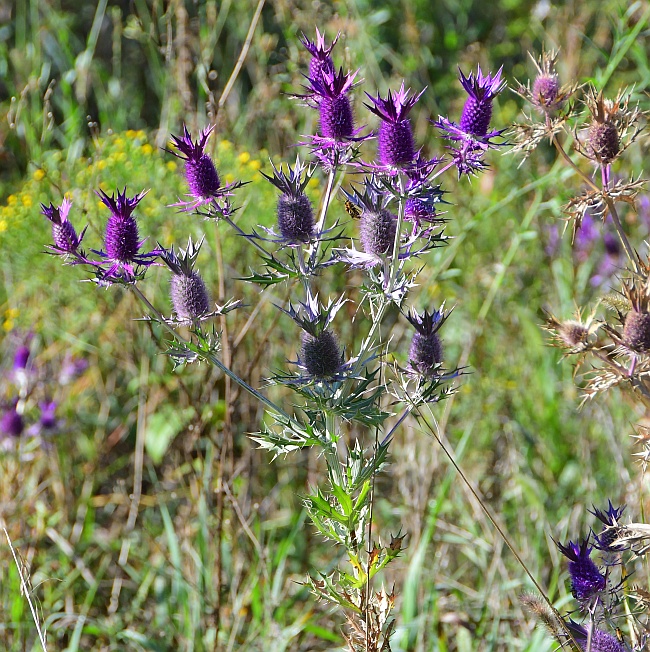Eryngium leavenworthii Torr. & A. Gray
Leavenworth Eryngo

Introduced
CC = *
CW = 5
MOC = 1
© SRTurner
Eryngium leavenworthii Torr. & A. GrayLeavenworth Eryngo | |
 |
Introduced CC = * CW = 5 MOC = 1 |
© SRTurner |
|
Family - Apiaceae Habit - Annual forb, glabrous, mostly purple-tinged, not or only slightly glaucous. Stem - Ascending to erect, to 1 m, unbranched below the inflorescence.
Leaves - Alternate, sometimes basal (these usually withered or absent at flowering), sessile or the basal leaves sometimes short-petiolate, the venation netted, the margins with a thickened whitened band. Basal and lower stem leaves with the blades 3-7 cm long, unlobed, broadly oblanceolate, tapered at the base, rounded to bluntly pointed at the tip, the margins spiny-toothed. Median and upper leaves with the blades 2.5-7.5 cm long, broadly obovate to nearly circular in outline, deeply palmately 3-7-lobed, the lobes pinnately lobed and/or toothed, the lobes or teeth with spiny tips.
Inflorescences - Cylindrical or barrel-shaped heads 2.0-3.5 cm long, terminal, solitary to several in paniculate clusters, short-stalked, purple, the branch points with reduced, leaflike bracts. Bracts subtending each head 4-8, 25-40 mm long, oblong-elliptic, narrowed or short-tapered to a spiny tip, the margins with narrow, spiny teeth or lobes. Terminal bracts (actually enlarged bractlets) 4-8, more or less similar to the bracts, but 10-35 mm long.
Flowers - Numerous, sessile, each subtended by a bractlet similar to the bracts, but 8-10 mm long. Sepals 4-6 mm long, oblong, with 3-5 narrow, spiny teeth or lobes at the tip. Petals oblong, rounded at the tip, purple (rarely white elsewhere). Ovaries with ascending, papery, linear scales.
Fruits - Schizocarps 2-4 mm long, oblong in outline, with appressed, linear scales. Flowering - July - September. Habitat - Prairies, grasslands, pastures. Origin - Native to the U.S. Lookalikes - Distantly, teasels (Dipsacus spp.) Other info. - This striking and charismatic plant is rare in Missouri, so far reported from only a single location in Bates County. That population was likely introduced accidentally as a contaminant in hay. It is more common immediately to our west, such as in far eastern Kansas, where the photos above were taken. The plant's range comprises a band from eastern Kansas, through Oklahoma and down to southwestern Texas. When in flower the plants are easily identified by their unique "purple pineapple" inflorescences, which are utterly unlike anything else in our Flora. Unlike its sibling plant E. yuccifolium (rattlesnake master), the spines on the bracts and leaves of E. leavenworthii are sharp and stiff enough to cause injury if handled carelessly. Photographs taken near Olathe, Johnson County, KS, 9-5-2024 (SRTurner). |